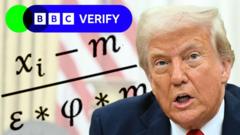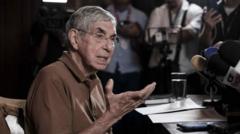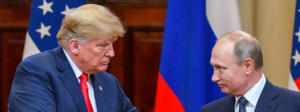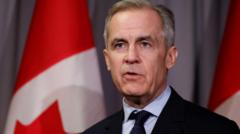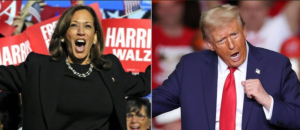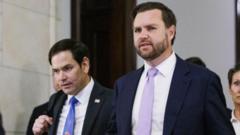As Kamala Harris campaigns for the presidency, her years as a California prosecutor are at the forefront of her narrative, highlighting her complex relationship with crime, justice, and evolving political landscapes.
Kamala Harris: The Prosecutor's Evolution from Courtrooms to Campaigns

Kamala Harris: The Prosecutor's Evolution from Courtrooms to Campaigns
Examining how Vice President Kamala Harris's prosecutorial background shapes her political identity ahead of the 2024 presidential election.
Kamala Harris’s trajectory from a California prosecutor to Vice President and presidential candidate is profoundly reflective of both her personal evolution and the shifting political tides within the United States. Recently, amidst her campaign for the Democratic nomination, Harris leveraged her prosecutorial experience to define her public persona and differentiate herself from her Republican challenger, Donald Trump.
Only a few months ago, President Joe Biden endorsed Harris for candidacy as the Democratic representative, propelling her from the White House to the stage of presidential hopefuls. In that strategic moment, Harris characterized herself as a relentless prosecutor who took on various criminals, effectively reminding voters of Trump's legal entanglements. “I know Donald Trump's type,” she stated, framing the upcoming contest as a battle between a seasoned prosecutor and a felonious opponent.
Harris's journey through California's criminal justice system has not been without controversy. Critics of her past as a prosecutor point to allegations of inconsistency based on shifting political climates. Yet, her ability to navigate these challenges speaks to her resilience in a turbulent political arena.
Harris began her career in law enforcement shortly after graduating from law school, tackling severe crimes during the 1990s amid Oakland’s turmoil from the crack-cocaine epidemic. Teresa Drenick, a former colleague, described the environment as intense, echoing the considerable emotional toll faced by young prosecutors. Harris quickly garnered a reputation for compassion, particularly in handling sensitive cases like child sexual assault.
Her rise through California's political ranks intertwined personal relationships with influential figures, including Willie Brown, the former speaker of the California State Assembly. Brown's mentorship introduced her to essential political networks that would shape her career. Despite criticism over her relationship with him, it significantly boosted her political profile.
Harris’s prosecutorial tenure became prominent following the shooting of a police officer, where she controversially opted for a life sentence over the death penalty, igniting backlash from various quarters. Nonetheless, she defended her decision as a matter of principle—a reflection of her political ideologies that would later serve as a bedrock for her campaigns.
As District Attorney and later California Attorney General, Harris attempted to reframe her image as a "progressive prosecutor." Initiatives focused on crime reduction, such as diversion programs for non-violent offenders and addressing youth victimized by sex trafficking, highlighted her dual emphasis on accountability and reform.
However, as she transitioned into a national role, her positions became increasingly scrutinized, particularly with a growing demand for criminal justice reform sparked by events like George Floyd’s murder. This catalyzed conversations surrounding her past decisions and led to her withdrawal from the 2020 presidential race before primaries began.
Now, Harris finds herself at another crossroads as she attempts to balance her past with a renewed campaign platform. As she engages with moderates and conservative voters, she has faced allegations of opportunism, with opponents branding her a “chameleon.” Yet, supporters assert her political maneuvers exemplify the pragmatism necessary for electoral success.
Ultimately, Harris's journey encapsulates a continual redefining process—one marked by challenges and strategic recalibrations. The questions regarding her true beliefs and the motivations behind her actions linger, yet her determination to carve a distinct political path remains evident. As the 2024 election looms, how she reconciles her prosecutorial past with her present ambitions may well shape the narrative of her candidacy, reflecting broader societal conversations on justice and leadership.


